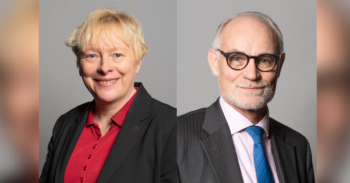
Humanist MPs from across the House of Commons have condemned comments made by the Prime Minister that the long-awaited legal ban on so called ‘conversion therapy’ will contain a loophole allowing these practices to still occur when it could be said to be ‘appropriate pastoral support (including prayer) in churches and other religious settings in the exploration of [an adult’s] sexual orientation or gender identity.’
Crispin Blunt MP, the Chair of the All-Party Parliamentary Humanist Group (APPHG), stated, ‘The Government is led by one of the most socially liberal, live and let live leaders in our history. Yet it is making a series of unforced errors that will serve to wholly unnecessarily alienate LGBT+ people and do untold damage to his reputation. The [Prime Minister] is in breach of promise on causes he supports. This nonsense must be put right before it does lasting real damage to LGBT+ people around the world and wrecks his reputation and torpedoes the values of Global Britain on human rights before we’ve even begun to establish them.’
Fellow APPHG member Angela Eagle MP also condemned the comments stating ‘This proposed “loophole” is so large, there would effectively be no ban on conversion therapy.’
Speaking on Thursday, the UN Special Rapporteur on Freedom of Religion or Belief, Dr Ahmed Shaheed, told MPs ‘International human rights law is clear that the right to freedom of religion or belief does not limit the state’s obligation to protect the life, dignity, health and equality of LGBT+ persons. The testimonies of survivors of conversion practices are chilling. Operating on the basis that there is something “wrong”, “sinful” or “pathological” in non-heterosexual-cis forms of sexual and gender identity, LGBT+ persons are assailed with physical and emotional abuse that have haunting consequences.’
The Government first committed to bringing in a legislative ban on conversion therapy in 2018, after its National LGBT survey revealed that 7% of LGBT people had undergone or been offered such practices. Of those who had undergone conversion therapy 51% reported that it had been conducted by a religious group or in a religious setting.
Humanists UK’s Director of Public Affairs and Policy Richy Thompson commented,
‘Humanists are strong advocates for freedom of religion or belief, but only so long as it does no harm to others. Conversion therapy is a highly coercive practice that can be deeply harmful to those who experience it, and we know it is within religious settings that the most damaging types of conversion therapy, such as exorcisms and forced prayer, occur. When people are experiencing such extreme distress over their sexual orientation or gender identity, they should be met with person-centred, therapeutically well-grounded support, not coercive, medically worthless practices that seek to push them in a particular direction.
‘It has been three years since the Government committed to ending conversion therapy and yet we still do not have any proposed legislation. The majority of conversion therapy is carried out in religious settings, and as a result these comments by the Prime Minister risk compounding this delay by potentially undermining the effectiveness of any ban. We urge the Government to bring forth legislation that makes sure no harmful practices are allowed to continue.’
Notes:
For further comment or information, please contact Humanists UK Director of Public Affairs and Policy Richy Thompson at press@humanists.uk or phone 020 7324 3072 or 020 3675 0959.
Read more about our work on conversion therapy.
Humanists UK is the national charity working on behalf of non-religious people. Powered by 100,000 members and supporters, we advance free thinking and promote humanism to create a tolerant society where rational thinking and kindness prevail. We provide ceremonies, pastoral care, education, and support services benefitting over a million people every year and our campaigns advance humanist thinking on ethical issues, human rights, and equal treatment for all.
